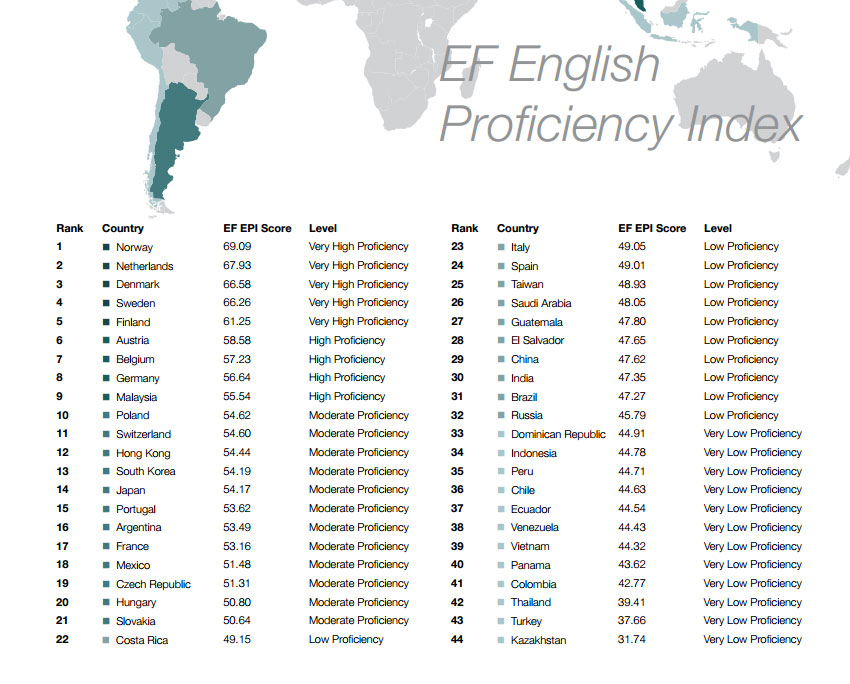英語能力と収入は相関関係
2013年11月13日
 Kuala Lumpur August 9, 2012
A study has found a correlation between English proficiency and a country's gross national income.
Countries with higher income per capita tend to be more proficient in the English language, based on the findings of international education company Education First (EF), using a standardised measurement for adult English proficiency.
The EF English Proficiency Index (EF EPI) is based on the results of a 2007 to 2009 survey covering more than 2 million people in over 40 countries.
English skills and income levels correlate in a "virtuous" cycle where greater proficiency in the language leads to higher income.
The gross national income per capita for countries that scored over 60 in the EF EPI was more than US$40,000 in 2008.
Norway, the Netherlands, Denmark, Sweden and Finland have the highest scores, between 61 and 70, clinching the top five spots, indicating "very high proficiency".
This is followed by other European countries - Austria, Belgium and Germany, which are ranked sixth, seventh and eighth under the "high proficiency" cluster. Next comes Malaysia, the only Asian country in the top 10, with a score of 55.54 for "high proficiency" in the English language.
In the moderate proficiency level (EPI score 50-55), English skills do not correspond with higher income, indicating that other factors come into play in generating national income for those countries.
Among the countries that scored below 45 points are Peru, Vietnam, Kazakhstan and Turkey, which have "very low proficiency" in the English language.
The EF EPI enables countries to evaluate their English proficiency, and is useful in gauging the effectiveness of English-language policies.
Compiled by EF, the official language training provider to the 2008 Beijing Olympics, the report states that up to 2 billion people will learn English in the next decade.
The report also covers age suitability for learning English. It states that learning English at a younger age does not mean better proficiency in the language. Although children in Spain and Italy started English between the ages of eight and 11, the two countries have the lowest adult proficiency levels in the European Union, compared to children in the Netherlands and Denmark, who started English courses between ages 10 and 12 (1984-2000).
The report cites factors like duration of learning, quality of instructors and teaching materials and methods as being essential in acquiring the language skills.
Parent Action Group for Education (Page) Malaysia chairman Datin Noor Azimah Abdul Rahim said European countries like Norway, Sweden and Denmark place just as much emphasis on the English language as their native languages.
English has always been the universal language of communication in commerce, science and technology, said Noor Azimah, who has 14 years' experience in the corporate world. Citing the newly-launched Tun Razak Exchange project, in which more than 100 top international companies are expected to set up base and transform Kuala Lumpur into a leading global centre for finance, trade and services, she said it is now even more important for Malaysians to raise their standard of English and gear themselves up for future progress and development.
Harvard University undergraduate admissions interviewer Nadiah Wan said the ability to communicate well in English has helped her advance in her career. She said: "Students will find it difficult to access knowledge and express their opinions without a strong command of the English language. The reason is because the majority of new discoveries, new intellectual discussions and new cultural developments at this point in time are in English.
"It doesn't mean that you can't come up with an idea like the iPhone or Facebook if you don't speak English. But it does mean that you will be one of the last people to find out about it and will, therefore, always have to play catch up while the rest of the world continues to innovate. Not being able to keep up and compete will also translate into lower salaries."
The Harvard graduate added: "Without English skills, I cannot be part of those discoveries, discussions and developments. I certainly would not have gone to university abroad and would never have had the opportunity to learn from other English speakers, nor would I have as many friends around the world."
(Nation Multi Media誌から)
Kuala Lumpur August 9, 2012
A study has found a correlation between English proficiency and a country's gross national income.
Countries with higher income per capita tend to be more proficient in the English language, based on the findings of international education company Education First (EF), using a standardised measurement for adult English proficiency.
The EF English Proficiency Index (EF EPI) is based on the results of a 2007 to 2009 survey covering more than 2 million people in over 40 countries.
English skills and income levels correlate in a "virtuous" cycle where greater proficiency in the language leads to higher income.
The gross national income per capita for countries that scored over 60 in the EF EPI was more than US$40,000 in 2008.
Norway, the Netherlands, Denmark, Sweden and Finland have the highest scores, between 61 and 70, clinching the top five spots, indicating "very high proficiency".
This is followed by other European countries - Austria, Belgium and Germany, which are ranked sixth, seventh and eighth under the "high proficiency" cluster. Next comes Malaysia, the only Asian country in the top 10, with a score of 55.54 for "high proficiency" in the English language.
In the moderate proficiency level (EPI score 50-55), English skills do not correspond with higher income, indicating that other factors come into play in generating national income for those countries.
Among the countries that scored below 45 points are Peru, Vietnam, Kazakhstan and Turkey, which have "very low proficiency" in the English language.
The EF EPI enables countries to evaluate their English proficiency, and is useful in gauging the effectiveness of English-language policies.
Compiled by EF, the official language training provider to the 2008 Beijing Olympics, the report states that up to 2 billion people will learn English in the next decade.
The report also covers age suitability for learning English. It states that learning English at a younger age does not mean better proficiency in the language. Although children in Spain and Italy started English between the ages of eight and 11, the two countries have the lowest adult proficiency levels in the European Union, compared to children in the Netherlands and Denmark, who started English courses between ages 10 and 12 (1984-2000).
The report cites factors like duration of learning, quality of instructors and teaching materials and methods as being essential in acquiring the language skills.
Parent Action Group for Education (Page) Malaysia chairman Datin Noor Azimah Abdul Rahim said European countries like Norway, Sweden and Denmark place just as much emphasis on the English language as their native languages.
English has always been the universal language of communication in commerce, science and technology, said Noor Azimah, who has 14 years' experience in the corporate world. Citing the newly-launched Tun Razak Exchange project, in which more than 100 top international companies are expected to set up base and transform Kuala Lumpur into a leading global centre for finance, trade and services, she said it is now even more important for Malaysians to raise their standard of English and gear themselves up for future progress and development.
Harvard University undergraduate admissions interviewer Nadiah Wan said the ability to communicate well in English has helped her advance in her career. She said: "Students will find it difficult to access knowledge and express their opinions without a strong command of the English language. The reason is because the majority of new discoveries, new intellectual discussions and new cultural developments at this point in time are in English.
"It doesn't mean that you can't come up with an idea like the iPhone or Facebook if you don't speak English. But it does mean that you will be one of the last people to find out about it and will, therefore, always have to play catch up while the rest of the world continues to innovate. Not being able to keep up and compete will also translate into lower salaries."
The Harvard graduate added: "Without English skills, I cannot be part of those discoveries, discussions and developments. I certainly would not have gone to university abroad and would never have had the opportunity to learn from other English speakers, nor would I have as many friends around the world."
(Nation Multi Media誌から)

